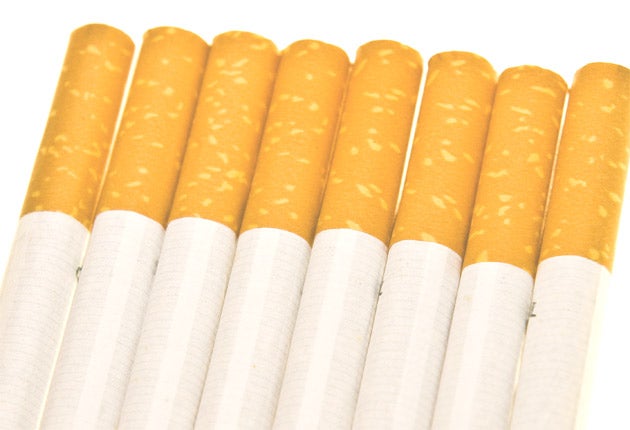15 cigarettes: all it takes to harm genes
Study reveals the genetic mutations suffered by smokers who go on to develop lung cancer

Your support helps us to tell the story
From reproductive rights to climate change to Big Tech, The Independent is on the ground when the story is developing. Whether it's investigating the financials of Elon Musk's pro-Trump PAC or producing our latest documentary, 'The A Word', which shines a light on the American women fighting for reproductive rights, we know how important it is to parse out the facts from the messaging.
At such a critical moment in US history, we need reporters on the ground. Your donation allows us to keep sending journalists to speak to both sides of the story.
The Independent is trusted by Americans across the entire political spectrum. And unlike many other quality news outlets, we choose not to lock Americans out of our reporting and analysis with paywalls. We believe quality journalism should be available to everyone, paid for by those who can afford it.
Your support makes all the difference.One genetic mutation occurs on average for every 15 cigarettes that a typical lung-cancer patient smokes, according to a study that has identified for the first time all of the mutations acquired during the lifetime of a cancer patient.
Scientists have completed a full genetic analysis of the genomes of cancer patients, and hope the information will lead to a fundamental understanding of the causes of cancer – and possibly drugs and treatments – by identifying the mutations that turn a healthy cell into a cancerous tumour cell.
They studied a lung-cancer victim who had built up about 23,000 DNA mutations in his lung cells that were linked with exposure to the toxins found in cigarette smoke and had accumulated over his lifetime.
They also looked at a patient with malignant melanoma, the most dangerous form of skin cancer, who had acquired 30,000 specific genetic mutations known to be associated with exposure to sunlight.
Scientists believe this new insight into the genetics of cancer will eventually lead to new drugs and tailor-made treatments that target the specific changes to the gene that help to trigger the disease, as well as new techniques for identifying secondary cancers that have evaded treatment in other parts of the body.
"For the first time, we have a comprehensive map of all mutations in a cancer cell," said Dr Peter Campbell of the Wellcome Trust Sanger Institute in Cambridge, which led the Cancer Genome project to decipher the entire DNA sequence of tumour cells in order to identify the mutations.
"The profile of mutations we observed [in the lung-cancer patient] is exactly that expected from tobacco, suggesting that the majority of the 23,000 we found are caused by the cocktail of chemicals found in cigarettes. On the basis of average estimates, we can say that one mutation is fixed in the genome for every 15 cigarettes smoked," Dr Campbell said.
The study, published in the journal Nature, involved the sequencing of the entire genome of a lung-cancer cell 60 times in order to be sure that all of the smallest mutations were identified. The scientists then compared the genome sequence with that of a healthy cell taken from the same patient.
A similar procedure was performed on the cells of a patient with skin cancer, which is how the researchers were able to show that the malignant skin cells contained changes that resulted from exposure to ultraviolet light, said Professor Mike Stratton at the Sanger Institute.
"These are the two main cancers in the developed world for which we know the primary exposure. For lung cancer it is cigarette smoke, and for malignant melanoma it is exposure to sunlight," Professor Stratton said.
"With these genome sequences, we have been able to explore deep into the past of each tumour, uncovering with remarkable clarity the imprints of these environmental mutagens [mutation-causing agents] on DNA, which occurred years before the tumour became apparent," he said.
Join our commenting forum
Join thought-provoking conversations, follow other Independent readers and see their replies
Comments